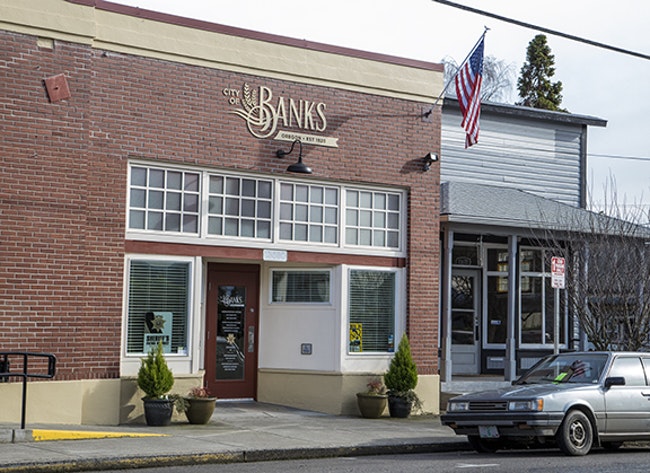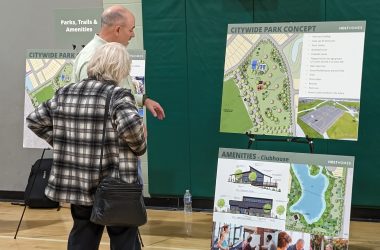The Banks City Council is considering drafting an ordinance that would require property owners to obtain a temporary permit from the city to allow people to lodge on their land in a vehicle for 30 days or less.
For now, the city council decided to continue taking the issue under consideration in future work sessions and public meetings.
The council is considering the permit due to concerns raised by Banks residents and business owners about homeless automobile drivers, especially those in RVs, “camping” on city streets, and in some cases in private downtown parking lots where property owners are allowing people to “lodge” for several nights.
Individual city councilors and Mayor Stephanie Jones said they are aware that many residents and business owners are concerned about the possibility of homeless camps being established in Banks—a constantly recurring issue in other municipalities across the U.S., City Attorney Dan Kears said—due in part to the widespread reports of the proliferation of homeless communities in Portland, Salem, and other large Oregon cities.
The council also is aware that some residents and property owners allow visiting friends or family, including those in need of a temporary place to stay, to live in an RV on their property, often in a driveway, for short periods of time, which is why the city is considering requiring a permit in those instances rather than issuing a city-wide ban on any and all overnight camping for any length of time.
The city most recently began prohibiting the use of vehicles for lodging on city streets and parking lots in 2017 in response to several incidents of people showing up and living in their car for several days or weeks, and also to a flurry of litigation on the east coast as cities adopted a variety of car camping prohibitions that were shot down in court, Kearns said.
“This is to start a conversation to see where the city would like to go with regard to first a category of people who visit and use RVs for a limited period of time, and in understanding the more pressing problem a lot of cities in the (Portland) metro area are seeing of people in RVs parking for long periods of time, which eventually attracts more RVs and cars,” Kearns said. “Some of the hard stops on the law with regards to regulating car camping — this falls under unusual punishment in how the courts view this when a local government tries to criminalize basic human functions like sleeping. If you criminalize sleeping, that’s a no-go.”
He said one possible solution the city council should consider is an approach used by the city of San Diego, which enforces time limitations on parking between 9:00 a.m. and 6:00 p.m., and within 500 feet of a residence or within a school zone.
Banks City Manager Jolynn Becker said the city established a fund to help drivers who may be stranded get to another location. Money from the fund sometimes is given to individuals who are contacted by one of the Washington County Sheriffs’ deputies while patrolling Banks to help get drivers to organizations and locations that provide services to people in need, or to another place where overnight camping is allowed.
“My recommendation is that you do not cite people for those things. That’s where you run into legal problems,” Kearns said. “We haven’t had any sheriffs’ deputies cite people so it hasn’t been a problem. But offering to help them (legally) justifies (police contact).”
Becker said Washington County officials are now meeting “every couple of months” with city managers throughout the county to talk about creating programs for people who don’t have homes and are living in their cars or on the street.
“We need to determine what process we put in place and make it very clear (in a city ordinance),” Becker said. “Perhaps we could require (property owners) to come into city hall and get a permit for 30 days that they have to renew every 30 days so that there is a process and they are clear as to what the city code requires.”
Kearns said that when drivers park a vehicle in a private parking lot, and perhaps camp overnight, the property owner gets to decide if they want to “call it in or not.”
“You all know from watching the news that Wal-Mart has a policy of allowing people to camp in their parking lots,” he said. “However, (city by city) Wal-Mart is being asked not to do this in their parking lots and they are complying and canceling the policy, but there are a number of large parking lot property owners around the country well known for allowing people to camp for the night.”
Kearns said this may not be as much of an issue in a rural setting like Banks compared to Portland and cities interconnected by the metro area, and that already the city of Banks doesn’t allow several campers to set up in one location at the same time.
“What we need here is a little more process and perhaps the definition of a vehicle to exclude ones that are built with a bed inside – I don’t know how to (legally) define that,” Mayor Jones said. “I would think if the vehicle has a sink and a bed that it is something that would classify as a recreational vehicle no matter how small or large it may be.”
Kearns interjected that people are sleeping in their Priuses all over the U.S.
“But it doesn’t have a sink or a bed in it,” Jones said.
“But what makes something a recreational vehicle and what doesn’t?” Kearns said.
“Dan, I don’t know if you’re just making things up or not,” Jones said.
When you let people stay long it attracts others and then you have a homeless camp and it attracts more people and they stay longer and then the proliferation of garbage comes with it, Kearns said.
“It’s very difficult once they get established to get them out of there,” he said. “These sorts of procedures (like the camping ordinance the Banks City Council is considering) are good … to weed out the itinerant vagabond types.”






